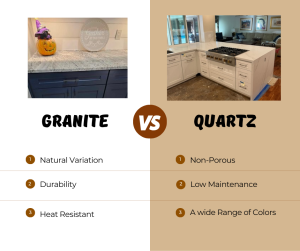What is better for your home, Granite or Quartz?
When it comes to choosing the perfect countertop stone for your home, two of the most popular options are granite and quartz. Both are known for their durability, aesthetics, and functionality, but each offers unique benefits. Let’s break down the differences to help you decide which is better for your needs.
Granite Countertops: Natural Beauty and Durability
Granite is a 100% natural stone, mined from the earth and cut into slabs. No two slabs are alike, giving granite its distinct appearance, with unique patterns, veins, and colors.
Pros of Granite:
- Natural Variation: Granite’s unique patterns and colors bring a one-of-a-kind look to your space. If you love the idea of incorporating nature into your home, granite is an excellent choice.
- Durability: Granite is incredibly hard and resistant to heat, scratches, and stains. With proper sealing, it can withstand everyday kitchen use and maintain its beauty for years.
- Value Addition: Granite is often seen as a luxury material and installing granite countertops can also increase the resale value of your home.
- Heat Resistance: You can place hot pots and pans directly on a granite countertop without worrying about damaging the surface.
Cons of Granite:
- Porous Nature: Granite needs to be sealed regularly to prevent staining, as it is porous and can absorb liquids.
- Seams: Depending on the size of your countertop, seams may be visible in granite, especially in areas with intricate designs.
- Limited Color Range: While granite has natural beauty, it doesn’t offer the wide array of color options that man-made materials like quartz do.
Quartz Countertops: Engineered Consistency and Low Maintenance
Quartz countertops are man-made, consisting of about 90-95% ground quartz (a natural mineral) mixed with resin and pigments. This engineering process gives quartz its consistent appearance and enhanced performance.
Pros of Quartz:
- Non-Porous: Unlike granite, quartz is non-porous, meaning it doesn’t need to be sealed. It’s resistant to stains, bacteria, and moisture, making it an ideal choice for kitchens and bathrooms.
- Consistency in Appearance: If you prefer a uniform look with consistent color and pattern, quartz is the way to go. You can get a sleek, modern appearance without the natural variation of granite.
- Low Maintenance: Quartz requires little to no maintenance. It doesn’t need to be resealed, making it perfect for busy households.
- Wide Range of Colors: Quartz is available in a vast array of colors, from bold and vibrant shades to more subdued, neutral tones.
Cons of Quartz:
- Less Heat Resistant: While quartz is durable, it’s not as heat resistant as granite. Extreme heat can damage the resin, so it is recommended to use trivets or hot pads for hot cookware.
- Price: Quartz countertops can be more expensive than some granite options, depending on the brand and design.
- Lack of Natural Variation: If you love the organic, unpredictable look of natural stone, quartz’s consistent appearance might not appeal to you.
Which is Better for You?
Choosing between granite and quartz ultimately comes down to personal preference and lifestyle needs.
- If you love the idea of a natural stone with unique patterns and don’t mind a little maintenance, granite is an excellent option. It’s ideal for homeowners who appreciate a more traditional, natural look.
- If you prefer a more consistent, modern aesthetic with low maintenance, quartz is likely the better choice. It’s perfect for families or individuals looking for durability and ease of upkeep.
Both granite and quartz are excellent choices, and you can’t go wrong with either. Whether you prioritize natural beauty or engineered consistency, each material will bring lasting style and functionality to your home.
